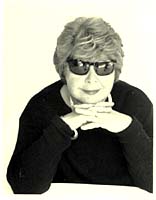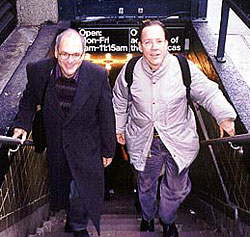|
The title of Charles Bernstein's collection of essays, My Way, is characteristically ironic; only in the most alternative of universes could Bernstein be imagined as Old Blue Eyes, leader of his own literary Rat Pack. More seriously, virtually every sentence in the book demonstrates that there can only be ways - provisional and plural. Moreover, the book's caustic and cautionary comments on identity politics - the dominant preoccupation in American literary practice and theory alike - suggests the 'My' is equally problematic. As ever, Bernstein puts into practice what he preaches; far from being conventional expository prose, the volume is a bricolage of poems in essay form, essays in verse, interviews, polemics, provocations ('There's more innovation and more cultural acumen in any episode of Ren and Stimpy than in any of the books of our last trio of (American) poet laureates'), puns and jokes. This seems appropriate for a poet who, in an earlier essay on comedy, boasts of working under the influence of the three Marxes - Chico, Groucho and Karl - and the four Williamses - Raymond, William Carlos, Tennessee and Esther. There is even (a somewhat revisionist gesture for so pointedly impersonal a poet) an autobiographical interview, which is, nevertheless, a good introduction to the poet and his preoccupations.
Trained in philosophy under Stanley Cavell at Harvard, Bernstein has long argued for 'poetry as epistemological inquiry'. As befits a writer whose pivotal collection of poems is called The Sophist (1987), he is joyfully contrarian and ever ready to reveal the rhetoric in both his own writing and the world's prevailing narratives: 'Verse is born free but everywhere in chains. It has been my project to rattle the chains."
The project in My Way is not 'to break down generic distinctions as much as to bring genres and styles into rhetorical play with one another'. The key institutional corollary of this is a desire to alter the discursive practices of academic writing, to challenge the 'tone lock' that limits thought to MLA guidelines. Bernstein's brief, then, is to extend poetic thinking to pedagogy, aware, as he is, that 'You can't fully critique the dominant culture if you are confined to the forms through which it reproduces itself'. This is demonstrated in various instances through the book, not least in the charged arena of identity politics, where, through the agency of the workshop poem, diverse ethnic material and experience is refamiliarized into the cultural norm. In an earlier book, A Poetics, Bernstein satirized such workshop formulas that can easily replace 'I see grandpa on the hill / next to the memories I can never recapture' with 'I see my yiddishe mamma on hester street / next to all the pushcarts I can no longer peddle', and so on, inserting your ethnic variant at will.
Bernstein's own poetry practice has been tireless in striving to find a language fit to reflect and affect the times. If his essays are an ambitious and exciting attempt at a formally various methodology, his poems are collages of extraordinary range and texture; no American poet since Ashbery has woven such multifarious material into his poems. This is allied to a full-blown and mordantly funny critique of the roles we are made to adopt, of socialization's masquerade. In a poem like 'Standing Target' from Controlling Interests (1980), the poet includes his own reports from summer camp ('Charlie has grown to enjoy our organised games / His interest carries throughout the / period, as a rule . . .'); similarly in 'Asylum', from Islets/Irritations (1983), the language of definition with all its damaging shorthand is again to the fore, but proceeding in syntactically severed sentences, so that each line plunges us in medias res, encouraging the reader to construct a fuller sense, rather than take the word of authority on trust.
The much-anthologized 'The Klupzy Girl', from the same collection, with its beguiling opening lines ('Poetry is like a swoon, with this difference: / it brings you to your senses'), is another compelling combination of found texts, exaggerated euphony (unlike some of his contemporaries, Bernstein veers often from 'ordinary' speech, finding echoes in those poets he claims possess a 'double hearing', in the soundplay of Ossian, Swinburne, Hopkins), and the palpably designing:
To stroll on the beach is to be in
the company of the wage-earner and the unemployed on the public way, but
to command a view of it from a vantage
both recessed and elevated is to enter
the bourgeois space; here vantage and view become consumable.
This poem, then, rejects the view from the honeymoon suite on to 'Dover Beach', an ear cocked for the 'long, withdrawing roar', just as it rejects the distanced and raised Romantic position of 'Lines Composed A Few Miles above Tintern Abbey"; it insists instead on the thick of things, on the web of words one cannot remove oneself from and contemplate in tranquillity. Much purportedly modern poetry in fact cleaves to Romantic and pastoral models; Bernstein calls instead for a poetry 'that engages the social world directly, by taking on its jargon and its technologies, its blather and its displacements, not only as subjects but as methods of organisation, as environments, to be sounded and tested and thought through by and in the poem'.
Bernstein's latest book of poetry, Log Rhythms, a serial poem made in collaboration with his wife, the artist Susan Bee, contains a segment that uses the Manhattan Yellow Pages as a resource, both to suggest the modern world's infinite variety and to track our circumscription by designation ('Bob's Construction / Bob's Diner / Bob's Hardware / Bob's Train and Hobby Center'); elsewhere in the poem's echo chamber, it is as if we are experiencing bourgeois culture's thousand twangling instruments, humming about our ears: advertising jargon, skewed commonplaces, nonsense verse and mock nursery rhymes abound. Nursery rhymes have a special significance in Bernstein's verse: they offer both a reminder that ideology coos at us over the crib and a potential liberation from conventional sense, a dawning awareness that the world is still to be made.

Marjorie Perloff
Marjorie Perloff has been one of the most trusted chaperones for Language poetry inside the academy. She is, moreover, one of the best close readers of innovative poetry. Her absorbing new collection of occasional essays, Poetry On and Off the Page, extends preoccupations articulated in previous works - for example, with poetry in an era of technological transformation, with the way figures from other disciplines, like John Cage, have charted the possibilities of a post-linear poetry through a kind of linguistic unconscious, and with the impact of Wittgenstein - particularly his claim that 'the limits of my language are the limits of my world' and its implications for poetry.

Among the Language poets writing under the sign of Wittgenstein that Perloff scrutinizes are Steve McCaffery, who in his Evoba writes 'If the aim of philosophy is, as / Wittgenstein claims, to show the fly the / way out of the fly-bottle,then the aim of / poetry is to convince the bottle that / there is no fly'. Perloff's deft exegesis emphasizes that in poetry, there is only the bottle itself, no extractable fly, no inside or outside language. Another chapter is devoted to Lyn Hejinian, whose Oxota: A short Russian novel exemplifies a poetry based on the rhetorical figure of parataxis - units placed together without connectives or subordination, thus requiring the reader's participation in the sense-making process. It is a mode Hejinian has previously adopted in her classic My Life, an ongoing poetic autobiography with a chapter and sentence for each year of the poet's life. This self-imposed formalism, and the variety of materials and positions with which she constructs her sentences, enables Hejinian to resist the atomization of conventional autobiography.
[You can readMarjorie Perloff's essay on Mina Loy ('English as a Second Language: Mina Loy's 'Anglo-Mongrels and the Rose'') from Poetry On and Off the Page - Essays for Emergent Occasions in Jacket # 5. - ed.]
In Artifice and Indeterminacy: An anthology of new poetics, Christopher Beach usefully brings together a number of influential essays and excerpts from larger studies by Language poets, and by a growing number of university-based critics and scholars interested in Language-oriented work. The subtitle alludes cunningly to Donald Allen's highly influential 1960 outsider anthology, The New American Poetry, while the shift from poetry to poetics is a telling sign of the times. Bob Perelman's essay addresses the impact of Ron Silliman's conception of 'The New Sentence' - a way of making the sentence, rather than the free-verse line, the basic unit of the poem - as a procedural method, and its adaptation by various poets including Hejinian. Each 'New Sentence' gains its disorienting effects by being placed next to another, to which it has, apparently, only tangential relevance. Some, such as the Marxist critic Fredric Jameson, have seized on such techniques to portray Language poetry as but a symptom of the radical disconnection of the times, but Perelman persuasively argues that Silliman and Hejinian fight the random parataxis of the channel-hop or supermarket visit with a more oppositional version, where readers create community through precise and creative acts of reading. In Silliman's words: 'The point at which you read each word (the / only point there is), two minds share a larger whole."
In another essay in the collection, Barrett Watten seizes on one of Silliman's decidedly unheroic particulars, an apparently banal sentence from the long poem 'Tjanting": 'Small white plastic fork whose handle ends in the figure of 'golden' arches.' For Watten, this sentence is more than a piece of social realism, it comments on larger social forms: monopoly capitalism will create many such forks, but there can be only one in the poem, transformed through attention.
This seems to bear out Perloff's claims that, however difficult or rarefied these poets are accused of being, they are also intensely in and of the world. In 'Poetry On and Off the Page', she takes Jameson to task for the 'synecdochic fallacy' by which he is able to locate high modernism in Van Gogh's 'A Pair of Boots', with its 'violent transformation of a drab peasant object world' and postmodernism in Andy Warhol's 'Diamond Dust Shoes', 'debased and contaminated in advance by their assimilation to glossy advertising images'. For Perloff, Jameson is simplifying both periods and artists; but it is also possible to see drab objects in Silliman's poetry - like the McDonald's logoed fork - as hovering tantalizingly between these terms: a space where contemporary poetry might operate critically.
In a typically combative essay on literary journalism's mistreatment of innovative poetries, Perloff includes among her exhibits a review in the TLS in 1993 by Glyn Maxwell of a range of books of poetry criticism (including some Language-oriented titles), in which the exasperated reviewer bemoans the fact that these poets continue to write about each other 'long after the magazine that gave them their name has disappeared along with the likelihood of anyone else taking an interest'. One wonders when exactly was the literary moment when (to borrow one of Charles Bernstein's splendidly chippy catchphrases) 'official verse culture' actually did take an interest; but the objects of such neglect thrive regardless. Works as stimulating, calculatedly cantankerous, and irrepressibly entertaining as My Way, and readings as acute and suggestive as those offered in Poetry On and Off the Page, suggest it will be worth following Language poetry and poetics for some time yet.
Paul Quinn is a freelance writer and programme maker.
He is currently working on a book about contemporary American poetry. This piece first appeared in the Times Literary Supplement.
|

